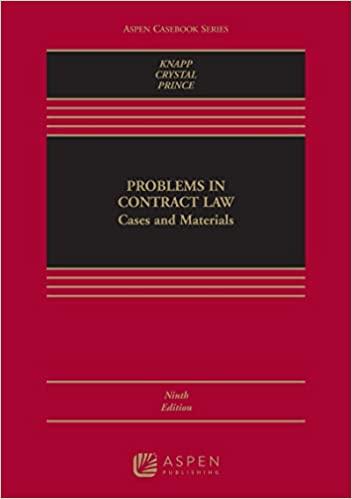Question
A personal representative is a person who is the executor or administrator of the estate of a person who is deceased i.e. their have been
A personal representative is a person who is the executor or administrator of the estate of a person who is deceased i.e. their have been tasked with the responsibility of administering the last will and testament of a person who is deceased.
Explanation:
A. Carmella's favorite relative is her nephew, Ferdinand, age 19. If she names him to be her personal representative, is he qualified to serve in your state?
A personal representative is a person who is the executor or administrator of the estate of a person who is deceased i.e. their have been tasked with the responsibility of administering the last will and testament of a person who is deceased. They perform the instructions to run the affairs as well as the wishes of the dead. It is either the individual who comes up with the will (testator) who appoints an individual to be the personal representative or the the court (in the case where there was no one who was appointed by the testator of the will).
In the above case, Ferdinand qualifies to serve in the State of New York as he is older than the age that is recognised by the state as a requirement of being a Personal Representative.
The legal requirement for being a Personal Representative in New York is as follows:
- They are required to be Eighteen years of age or older.
- They are required to be competent
- They can either be a domiciliary or a non domiciliary of the state of New York
- They should not be convicted of committing a felony
B.Would Ferdinand be eligible to serve if he had been convicted of the felony of possessing and using drugs?
In this case Ferdinand will not be able to serve because he had been convicted of a felony. In the state of New York it is a Class A-II Felony to be found in possession or using drugs.
Under the Surrogate's Court Procedure Act 707, disqualifies felons from serving regardless of the crime committed, the age of the felon or when the felony was committed. All felons are said to be unfit to take care or manage the affairs of other people in Surrogate's Court.
Furthermore, it does not matter whether the felony was committed outside the state, as long as the crime is regarded as a felony under the New York State law, then the person is barred from serving in the surrogate court.
Step by Step Solution
There are 3 Steps involved in it
Step: 1

Get Instant Access to Expert-Tailored Solutions
See step-by-step solutions with expert insights and AI powered tools for academic success
Step: 2

Step: 3

Ace Your Homework with AI
Get the answers you need in no time with our AI-driven, step-by-step assistance
Get Started


